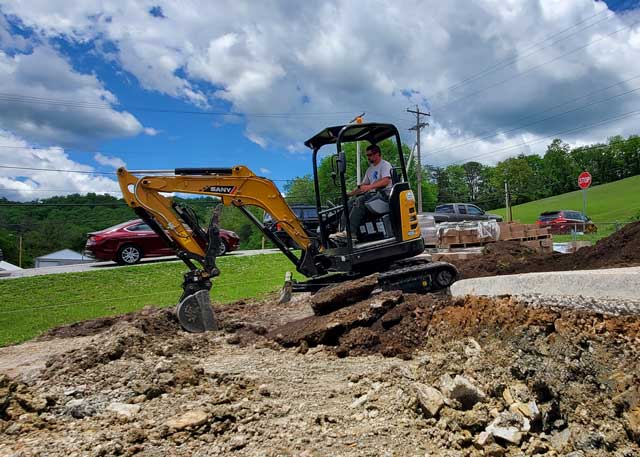Lancaster Trenching - Specialist Trenching Solutions in Lancaster, Ohio
Lancaster Trenching - Specialist Trenching Solutions in Lancaster, Ohio
Blog Article
Comprehensive Excavation Techniques: Mastering the Principles for Success
In the world of construction and civil design, the value of reliable excavation techniques can not be overemphasized. The mindful planning, exact execution, and thorough attention to information required in excavation projects demand an extensive technique that encompasses different basic aspects. From initial dirt evaluation to the implementation of security steps and normal progress surveillance, understanding these core components is important for achieving success in any kind of excavation undertaking. However, the true proficiency lies not merely in recognizing these fundamentals however in perfectly integrating them to browse the complexities of excavation projects with skill.
Comprehending Excavation Task Planning

The preliminary phase of any kind of excavation job is the planning stage, where important choices are made that can substantially affect the result of the project. Recognizing the project extent, spending plan, and timeline restrictions is important for creating an extensive excavation plan that makes certain the project's success.
One key aspect of excavation task preparation is the development of a thorough timeline that lays out the sequence of deadlines, tasks, and turning points. This timeline serves as a roadmap for the task team, permitting them to track development and make required modifications to make certain the job remains on timetable. Furthermore, a well-defined spending plan that makes up all expenditures, including tools leasing, labor costs, and products, is necessary for preventing expense overruns and hold-ups. By very carefully thinking about all these elements during the preparation stage, excavation jobs can be carried out successfully and successfully, causing effective outcomes.
Soil Analysis and Site Assessment
Carrying out thorough soil analysis and site analysis is a vital action in the preparation stage of any excavation job. Soil analysis involves establishing the make-up, framework, and homes of the soil at the excavation site. This info is important for understanding the soil's bearing capacity, moisture web content, and possibility for disintegration, which are key consider identifying the excavation methods and tools required for the task.
Website evaluation exceeds dirt evaluation and incorporates a wider evaluation of the total website problems. This analysis consists of recognizing any type of possible dangers, such as underground energies, ecological worries, or unstable terrain, that could influence the excavation process. By thoroughly evaluating the site, project supervisors can establish efficient excavation methods that prioritize safety and security, effectiveness, and environmental management.
Utilizing innovative innovations like ground-penetrating radar, dirt sampling, and drone surveys can boost the accuracy and performance of dirt analysis and site examination. Spending time and sources in these preliminary actions can ultimately conserve time and avoid costly delays or difficulties during the excavation procedure.
Tools Selection and Application
Efficient excavation tasks depend greatly on calculated devices selection and application to guarantee optimum efficiency and performance. Selecting the ideal equipment for the job is vital in taking full advantage of effectiveness and minimizing downtime. Elements such as the type of dirt, depth of excavation, and task scope play a significant duty in figuring out the most appropriate devices for the job at hand.

In enhancement to picking the appropriate equipment, appropriate application is essential to task success. Operators has to be trained to handle the devices safely and successfully - excavating ohio. Regular upkeep checks and prompt fixings assist protect against malfunctions and guarantee regular efficiency throughout the project
Safety And Security Steps and Rules Conformity
In the world of excavation projects, focusing on precaution and compliance with guidelines is vital to making sure a legitimately sound and protected functional atmosphere. Safety measures incorporate a series of techniques, consisting of carrying out extensive site assessments, applying proper signs and obstacles, and giving adequate security training for all employees associated with More Help the excavation procedure. Adherence to policies, such as OSHA requirements in the United States, makes certain that the excavation project meets the required requirements to shield employees, onlookers, and the surrounding setting.
Surveillance Progression and Adjusting Approaches
Just how can predict managers properly track the development of excavation tasks and adapt their approaches as necessary to enhance outcomes? Tracking progress is crucial for guaranteeing that excavation tasks stay on track and satisfy deadlines. Task managers can utilize different devices and methods to track progress, such as day-to-day progression records, routine site evaluations, and progressed monitoring modern technologies like drones and GPS tracking systems. By continually keeping track of the job's improvement, supervisors can identify any potential hold-ups or concerns at an early stage and take aggressive measures to address them.

Verdict
In conclusion, understanding the principles of detailed excavation strategies is important for the success of any job. By understanding project planning, examining soil and site conditions, picking proper equipment, abiding by safety and security policies, and keeping track of development, project managers can make sure a reliable and smooth excavation process. Carrying out these approaches will certainly result in successful outcomes and lessen potential dangers or setbacks throughout the excavation task.
The preliminary phase of any excavation job is the planning phase, where important choices are made that can substantially impact the outcome of the project. Recognizing the job scope, timeline, and budget plan restraints is vital for creating an extensive excavation strategy that ensures the project's success.
Just how can predict supervisors successfully track the innovation of excavation tasks and adapt their approaches accordingly to optimize outcomes? By carefully monitoring progress and being eager to adapt strategies, project supervisors can boost the overall success of excavation tasks.
By comprehending job planning, analyzing dirt and site conditions, picking proper equipment, abiding with safety and security laws, and monitoring progress, project supervisors can ensure a reliable and smooth excavation process.
Report this page